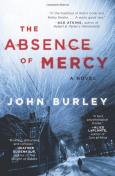BKMT READING GUIDES
The Absence of Mercy: A Novel
by John Burley
Paperback : 352 pages
1 club reading this now
0 members have read this book
John Burley’s The Absence of Mercy is a harrowing tale of suspense involving a brutal murder and dark secrets that lie beneath the surface of a placid, tight-knit Midwestern town.
When a brutally murdered teenager is discovered in the woods surrounding a small Ohio town, Dr. Ben ...
Introduction
John Burley’s The Absence of Mercy is a harrowing tale of suspense involving a brutal murder and dark secrets that lie beneath the surface of a placid, tight-knit Midwestern town.
When a brutally murdered teenager is discovered in the woods surrounding a small Ohio town, Dr. Ben Stevenson—the town’s medical examiner—must decide if he’s willing to put his family’s life in danger to uncover the truth. Finding himself pulled deeper into an investigation with devastating consequences, he discovers shocking information that will shatter his quiet community, and force him to confront a haunting truth.
With its eerie portrait of suburban life and nerve-fraying plot twists, The Absence of Mercy is domestic drama at its best for fans of Harlan Coben, Laura Lippman, Jennifer McMahon, and Lisa Gardner.
Editorial Review
Author One-on-One: John Burley and William Landay


New York Times best-selling author William Landay's most recent books include the novels Defending Jacob and Mission Flats.
William Landay: Congratulations on the upcoming release of your debut novel, The Absence of Mercy. Itâ??s a gripping psychological thriller, but there are some deeper themes at work here. As a writer, I know that inspiration can come from many different sources. What inspired this story?
John Burley: Thank you, Bill, and congratulations to you on the phenomenal success of Defending Jacob. The idea for my novel was born shortly after the birth of my daughter. During those first few days, I was struck with the realization that here is another human being for whom I would sacrifice everything to protectâ??including my own life, if necessary. The intensity of such love and dedication fascinated me, and it wasnâ??t long until I started thinking about how far it could be stretched, about what a parent might be capable of if they were ever pushed to the breaking point.
WL: Like you and your wife, the parents in this novel are both physicians. How did your professional background contribute to the story?
JB: Itâ??s sound advice to write about what you know. My training as an emergency medicine physician brings what I hope is a level of realism to the medical scenes, but it also gives the reader an opportunity to experience what life is like on the other side of the stethoscope. Physicians dedicate their lives to relieving human suffering, but they seldom talk about their own suffering, about how the practice of medicine grabs hold of you and never lets go. The long hours, the time spent away from family, the patient you were unable to save despite your best effortsâ??it all takes a toll. In the end, weâ??re as human as everyone else.
WL: Your wife is a forensic psychiatrist, right? Was that helpful in developing your characters?
JB: Immensely. The story involves a serial killer who terrorizes a small town. We tend to think of such individuals as extremely rare. But many serial killers are sociopaths, and what I learned through discussion with my wife is that sociopaths are present in almost all communities. About 4% of men and 1% of women fit the diagnostic criteria. They frequently blend in to the community, and are harder to identify than one might imagine. Not all sociopaths become serial killers, of course, but for many of them the potential is there. If that doesnâ??t make you lock your doors at night, I donâ??t know what will.
WL:Have you always wanted to be a writer, or did that come later in life?
JB:Iâ??ve wanted to be a novelist since I was about ten years old. But when it came time to choose a career path the thought occurred to me that writing novels for a living was a long shot and that I needed a day job. I decided to go to medical school, and things sort of snowballed from there. Itâ??s a long training processâ??so many hurdles along the way. About eight years later I came up for air, looked around, and realized I was no closer to becoming a novelist. So I sat down at my desk during the few days each month that I wasnâ??t working in the emergency department, and I began to write. Three years later I finished the first draft, but getting to the point of publication involved another three years. And I thought medical school took a long time.
WL: You continue to work full-time in an emergency department. How are you able to balance the worlds of medicine, writing, and family?
JB: I prioritize as best I can and address the most imminent deadlines first. My wife is extremely supportive, and my six-year-old daughter is a persistent reminder of whatâ??s truly important in life. Still, itâ??s not easy to balance so many worlds. But what can I do? I love them all.
Discussion Questions
No discussion questions at this time.Book Club Recommendations
Recommended to book clubs by 0 of 0 members.
Book Club HQ to over 88,000+ book clubs and ready to welcome yours.
Get free weekly updates on top club picks, book giveaways, author events and more








